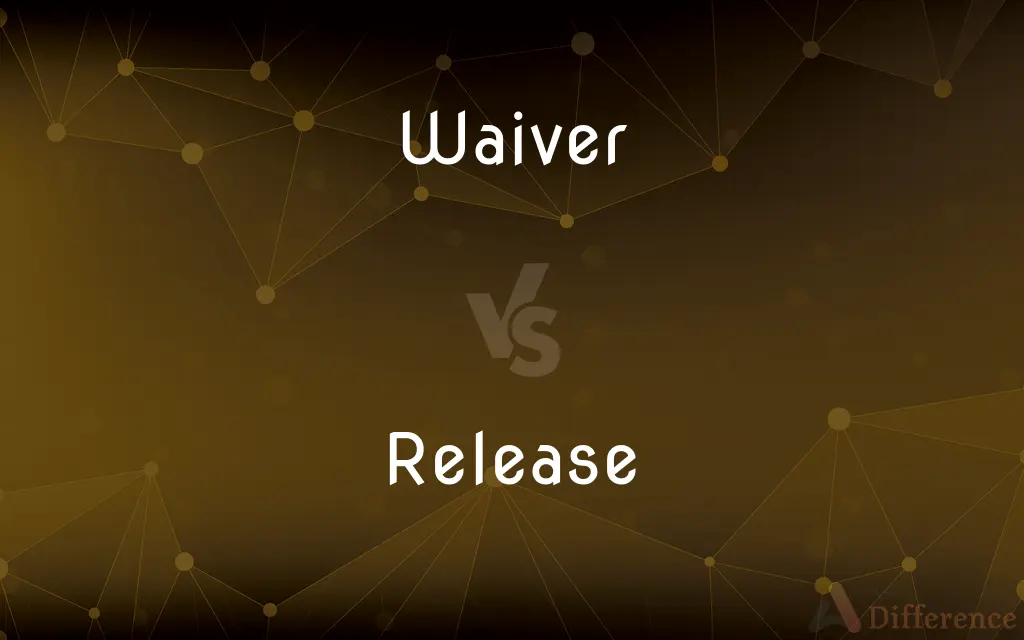Waiver vs. Release — What's the Difference?
By Fiza Rafique & Maham Liaqat — Updated on March 11, 2024
A waiver is an intentional relinquishment of a known right, often used to forgo legal claims in advance, while a release is a formal agreement that absolves another party from liability for past or future actions.

Difference Between Waiver and Release
Table of Contents
ADVERTISEMENT
Key Differences
A waiver is a preventative measure, where one party voluntarily forsakes their right to pursue legal action or claim against another party in specific circumstances. It's often signed before participating in potentially hazardous activities, acknowledging the risks involved. A release, on the other hand, is typically used after an incident or dispute has occurred, where one party agrees not to hold the other responsible for any claims, damages, or liabilities related to the event.
Waivers are commonly used in contexts where there's potential risk of harm or loss, such as sports, events, or certain services, to protect service providers from legal claims. Releases are more broad in application, covering a wide range of situations from settling disputes to transferring rights, and can be used in legal, corporate, and personal contexts to resolve liabilities or claims.
The language and legal requirements of waivers and releases can vary significantly based on jurisdiction and the specific circumstances they cover. Waivers often include detailed descriptions of risks and a clear statement of understanding and acceptance of those risks. Releases, while also needing to be clear and comprehensive, might focus more on the specifics of the incident or agreement at hand, detailing the scope of what is being released.
Both waivers and releases are binding legal documents, but their enforceability can be influenced by factors such as the clarity of language, the voluntariness of agreement, and the presence of any undue influence or misrepresentation. It's crucial for the language used in both to be precise and for the parties signing to fully understand the implications.
While waivers and releases serve different functions, they share the common goal of mitigating legal risks and protecting parties from potential lawsuits. In essence, a waiver is about preventing future claims for known risks, whereas a release is about absolving responsibility for past or potential issues.
ADVERTISEMENT
Comparison Chart
Purpose
To relinquish a known right or claim in advance.
To absolve another party from liability for past or future actions.
Use Case
Before an activity or event with potential risks.
After an incident or dispute to resolve liability.
Scope
Often specific to certain activities or risks.
Can be broad, covering a range of situations.
Legal Requirement
Must clearly enumerate the rights being waived.
Must clearly outline the scope of liabilities being released.
Enforceability
Dependent on voluntariness, understanding, and fairness.
Also dependent on clarity, specificity, and mutual consent.
Compare with Definitions
Waiver
Voluntary relinquishment of a right.
Signing the waiver, she agreed not to sue the park.
Release
A formal acknowledgment of resolution.
The release confirmed that both parties had settled their differences.
Waiver
A precondition for participation.
He couldn't join the race without signing the waiver.
Release
A settlement of disputes.
They signed a release to end the legal battle amicably.
Waiver
A document preventing future legal claims.
The waiver outlined the risks of rock climbing.
Release
A transfer of rights or property.
The artist's release allowed her work to be used commercially.
Waiver
An acknowledgment of risk.
The waiver made clear the potential dangers involved.
Release
An agreement to absolve liability.
The release form cleared the company from future claims.
Waiver
A protective measure for service providers.
The gym required a waiver for all members.
Release
A tool for legal clarity.
The release specified which claims were being waived.
Waiver
A waiver is the voluntary relinquishment or surrender of some known right or privilege. Regulatory agencies of state departments or the federal government may issue waivers to exempt companies from certain regulations.
Waiver
Intentional relinquishment of a right, claim, or privilege.
Waiver
The document that evidences such relinquishment.
Waiver
A dispensation, as from a rule or penalty.
Waiver
Permission for a professional athletic club to assign a player to the minor leagues or release a player from the club, granted only after all other clubs have been given the opportunity to claim the player and have not done so.
Waiver
A deferment.
Waiver
To provide with a waiver or issue a waiver for.
Waiver
The act of waiving, or not insisting on, some right, claim, or privilege.
Waiver
(legal) A legal document removing some requirement, such as waiving a right (giving it up) or a waiver of liability (agreeing to hold someone blameless).
I had to sign a waiver when I went skydiving, agreeing not to sue even if something went wrong.
Waiver
Something that releases a person from a requirement.
I needed a waiver from the department head to take the course because I didn't technically have the prerequisite courses.
I needed a waiver from the zoning board for the house because the lot was so small, but they let me build because it was next to the park.
Waiver
(obsolete) The process of waiving or outlawing a person.
Waiver
(transitive) To waive (to relinquish, to forego).
Waiver
Misspelling of waver
Waiver
The act of waiving, or not insisting on, some right, claim, or privilege.
Waiver
A formal written statement of relinquishment
Common Curiosities
Is a waiver always legally binding?
Waivers can be legally binding if properly executed, but enforceability may vary by jurisdiction.
Can a release cover future incidents?
Releases can cover future incidents, but the scope must be clearly defined.
Are waivers only used in risky activities?
While often used for risky activities, waivers can also apply to other situations where legal claims might arise.
Can a release be used in personal disputes?
Yes, releases can be used to settle personal disputes and absolve liabilities.
Does signing a waiver remove all legal recourse?
Signing a waiver typically limits legal recourse, but exceptions exist, such as gross negligence.
Can a waiver or release be challenged in court?
Yes, they can be challenged on grounds such as vagueness, duress, or misrepresentation.
Do both parties need a copy of the release?
It's advisable for both parties to retain a copy for their records.
Can minors sign waivers or releases?
Minors generally cannot sign legally binding documents, including waivers and releases, without parental consent.
Are digital waivers and releases valid?
Digital waivers and releases can be valid if they meet the legal requirements and are properly executed.
Can waivers and releases be revoked?
Once signed, they are generally binding, but revocation may be possible under specific circumstances or mutual agreement.
Can a waiver protect against illegal activities?
Waivers cannot protect against liability for illegal activities or gross negligence.
Is consideration required for a release to be valid?
Consideration, or something of value exchanged, is often required for a release to be legally binding.
Do waivers and releases need to be notarized?
Notarization is not always required but can add legal validity in certain jurisdictions.
How long do waivers and releases remain effective?
The duration depends on the terms of the document, but some may have indefinite effect unless otherwise specified.
How specific do waivers and releases need to be?
They should be specific enough to clearly outline the rights or liabilities involved and the scope of the agreement.
Share Your Discovery

Previous Comparison
Capacity vs. Utilization
Next Comparison
Aramaic vs. ArabicAuthor Spotlight
Written by
Fiza RafiqueFiza Rafique is a skilled content writer at AskDifference.com, where she meticulously refines and enhances written pieces. Drawing from her vast editorial expertise, Fiza ensures clarity, accuracy, and precision in every article. Passionate about language, she continually seeks to elevate the quality of content for readers worldwide.
Co-written by
Maham Liaqat













































